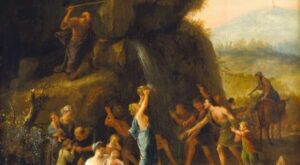Glenn Packiam, associate senior pastor of New Life Church in Colorado Springs, Colorado, says the early church was persecuted by Rome not because Rome was anti-religion, but because the church represented an existential threat to society as a whole. In a sermon video clip, Packiam posits the church as a community is one of the few forces capable of “undoing” society as we know it.
Packiam begins the video by describing his process of becoming an American citizen in 2009 and how much he loves the country’s principles. But he notes that America—for all of its uniqueness as a nation—is not the “most revolutionary community in human history.” That distinction goes to the church.
“How is the church the most revolutionary community in human history?” Packiam asks. “It’s because of what the church did. Prior to Christianity, human societies organized by families. Ancestry. They organized by geography and region: ‘This is our corner of the land.’ They organized by ethnicity. They were organized by certain patterns of living: ‘There are the nomadics, these are the settlers.’ But when the church arrived, it was revolutionary in the ancient world because it began to transcend other ways of defining communal identity. It was absolutely stunning.”
He says Romans of the time struggled to understand this new Christian community—and we know this because we have access to their letters.
“Last year I read a book that compiled the opinions of the Romans as they wrote letters to one another trying to figure out who these Christians were,” Packiam says. “… They’re looking at this new community and scratching their heads and saying, ‘How do men and women eat together and it [doesn’t] turn into an orgy?’ Literally, they were writing letters saying surely something scandalous is going on. And [the believers] were like, ‘No, it’s not, actually. Because we know how to treat one another with respect.’ That was revolutionary. They said, ‘How is it that in these gatherings there are masters and slaves that worship together as equals, that pray together as equals before God, as if Jesus is the only master over all? How is it that that can happen? How is it that rich and poor can gather in the same household at the same table? Who are these people?'”
It was too much for Roman society to handle, as Packiam explains it.
“We tend to think that Rome persecuted Christians because Rome was a secular state,” Packiam says. “We sort of imagine it like the Communist Soviet Union or Communist China. We’re like, ‘Oh, Rome was sort of like that. They were anti-religion.’ That was the exact opposite of the truth. Rome was pro-religion. They wanted all religions, all gods, all forms of worship. They wanted all the idols except for one name: the name of Jesus. Why? Because the name of Jesus was the only name that threatened to undo society as they knew it. Every other idol left the status quo. Every other idol let you keep your prejudices. … But one name came to disrupt it all: the name of Jesus.”
What do you think? Let us know in the comments.
See an error in this article?
To contact us or to submit an article





















